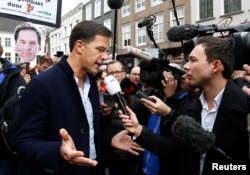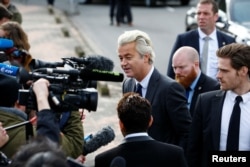Mainstream Dutch political parties continue to rule out a possible coalition with the Freedom Party of far-right leader Geert Wilders, despite the fact his party is predicted to come in second in Wednesday’s elections.
During a debate between current Prime Minister Mark Rutte and far right leader Wilders, Rutte repeated once again that he “will not work together” with the Wilders’ Freedom Party. He added that even asking Wilders to support a possible minority coalition, as happened between 2010 and 2012, will not be an option.
The prime ministers’ party is not the only political party stating publicly that it will never form a coalition with the far right leader. Wilders labeled the pre-election exclusion as “undemocratic” but also said he doesn’t believe the prime minister will shun him in the end.
Some Wilders’ supporters, interviewed at a campaign event say it is unfair that other political parties will not even agree to preliminary discussions. Jurgen Faber, a truck driver who supports the far-right leader, says it’s not fair to voters. “I don’t think Dutch voters will let themselves be sidelined.”
Coalitions of two or three parties are needed to govern in the Netherlands as no party has ever won an outright majority. The current ruling cabinet is made up of the conservatives, liberals and the Social Democrats. More than 25 parties are fielding candidates in the upcoming elections. Due to the fragmented electorate and the exclusion of Wilders’ party, a new ruling coalition could possibly involve four or more political parties.
Parallels in Belgium
Parties in neighboring Belgium have ruled out coalitions with far-right parties ahead of elections since the late eighties. The so-called "Cordon Sanitaire" was introduced after nationalist party Flemish Interests, previously known as the Flemish Bloc, won big. A resolution signed by the remaining political parties read that “no political agreements or arrangements” would be made with the far-right movement which “fails to acknowledge human rights and the principles of democracy.”
Herwig Reynaert, a Belgian political science professor at the University of Ghent, says a cordon sanitaire is not undemocratic because the remaining parties forming a coalition do have a democratic majority.
“Still, this is not always clear to the voter. That is why it’s important that political parties and political leaders clearly explain why they don’t want to work together with a certain party.”
One of the reasons Dutch Prime Minister Rutte gave for excluding Wilders during the Monday evening debate, was that he felt Wilders had “radicalized” on some issues. Wilders has called for the closing all mosques and for banning the Quran.
Reynaert says the Belgian cordon sanitaire has succeeded in excluding a far-right party, but not in excluding its ideas.
“The political agenda of Flemish Interests led to themes such as security and immigrants being more prominently discussed by other political parties. So in a way, those who are excluded can still influence the ones in power.”
In Belgium, many issues discussed by Flemish Interests termed too far-right years ago, are now included by other political parties. One of them, the New Flemish Alliance, is even a member of the current Belgian ruling coalition.
Situation in France
In France, the far-right party Front Nationale is expected to win the first round in presidential elections this spring. In the final round of a vote in 2002, a nationwide effort to block Front Nationale was among the factors enabling incumbent president Jacques Chirac to get reelected. This year, Front Nationale is again expected to make it to the final round but many of its priority issues are also adopted by other French politicians.
In the Netherlands, the prime minister's party has also been blamed for trying to attract Wilders supporters by using more right-wing rhetoric. A full-page ad by Rutte in several newspapers during the campaign urged people “to act normal or leave” the Netherlands. Last year, Rutte also called for Turkish-Dutch demonstrators to “get lost,” a statement he refused to renounce. Many believed these statements were made to appeal to voters supporting the Freedom Party.
The only political party that has not ruled out teaming up with Wilders’ is 50Plus, a party focused on pensioners and seniors. 50Plus leader Henk Krol, expected to win 10 seats, wrote in an opinion piece that Freedom Party voters shouldn’t be excluded beforehand, because “everyone will understand what impression that will leave and how the Freedom Party can grow stronger from this.” But the two are unlikely to find common ground on the issue of allowing Muslim refugees into the country.






